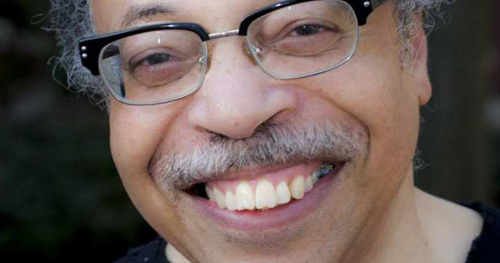
Can $25,000 prize draw out the ‘divine’ in Canlit?
November 30, 2016
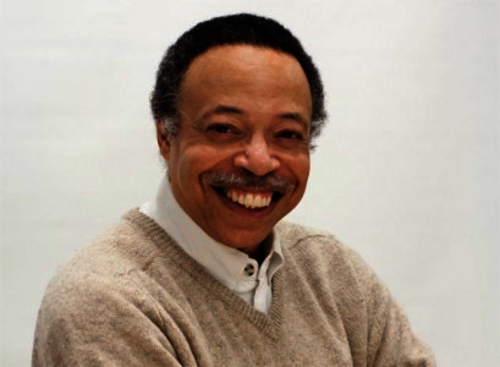
New $25K Canadian literary prize focuses on religious faith
A new literary prize is awarding $25,000 to short story and poetry writers who focus on the theme of religious faith in Canada. The Ross and Davis Mitchell Prize for Faith and Writing will be awarded every other year beginning in 2017 to original, unpublished poetry and short stories. The prize is founded by the think tank Cardus, "dedicated to the renewal of North American social architecture." First-place winners in each of the two categories will win $10,000, while $2,500 will go to two runners-up - one for poetry, one for short stories. According to the prize's project lead, Doug Sikkema, the prize seeks to encourage "the diverse writers of faith in Canada." "The prize is meant to show a real picture of the joys and struggles, the pleasures and the pains, of what being religious in Canada entails," Sikkema says. Parliamentary poet laureate George Elliott Clarke will judge the poetry category of the inaugural Ross and Davis Mitchell Prize for Faith and Writing, along with U.K.-based British-Canadian poet Todd Swift and Deborah Bowen, chair of the English department at Redeemer University College in Ancaster, Ont. The short story category will be judged by PEN Canada president Randy Boyagoda; literary critic, professor and writer David Staines; and novelist and psychotherapist Susan Lynn Reynolds. The deadline for the prize is June 30, 2017, with winners announced in the fall. Shortlisted writers for the prize will have their work published in an anthology to be published in 2018.
November 22, 2016
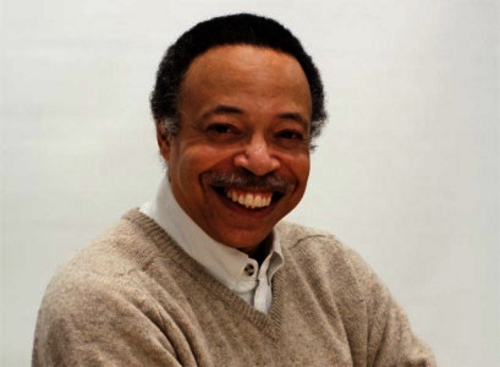
New national prize awards $25,000 for faith in literature
North American think tank Cardus‚ as part of its Faith in Canada 150 initiative‚ has launched a new national literary award recognizing authors who take on themes and elements of faith in their writing. The Ross and Davis Mitchell Prize for Faith and Writing will award $25,000 to writers of poetry and short stories‚ with $10,000 going to a first-place winner and $2,500 to a second-place winner in each category. Shortlisters will also have their work published in a special anthology‚ to appear in 2018. The prize will be administered every other year‚ and will only accept original‚ unpublished work to “catalyze the new generation of such writers‚” according the prize’s project lead‚ Doug Sikkema. “Consultation with publishers and literary groups has confirmed our suspicion that more can be done to help the diverse writers of faith in Canada‚” Sikkema says. “The prize is meant to show a real picture of the joys and struggles, the pleasures and the pains, of what being religious in Canada entails.” The poetry prize will be judged by parliamentary poet laureate George Elliott Clarke‚ University of Cambridge writer-in-residence Todd Swift‚ and Redeemer University College English professor Deborah Bowen‚ while the short-story prize will be judged by Randy Boyagoda, PEN Canada president and St. Michael’s College principal and vice-president‚ novelist and poet Susan Lynn Reynolds‚ and Journal of Canadian Poetry editor and University of Ottawa English professor David Staines. The submission deadline is June 30‚ 2017. A prize gala will take place in the fall.
November 21, 2016
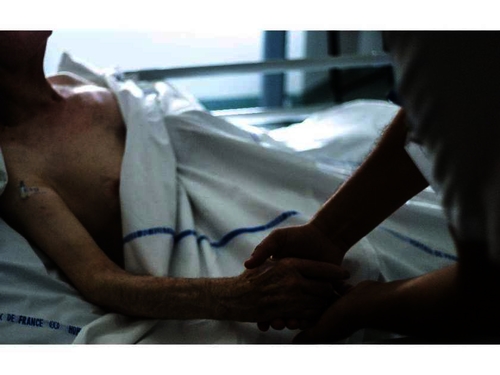
End-of-life care requires communities to mobilize
Ottawa will be ground-zero this week for a major conference aiming to hammer out a consensus on palliative care. With physician-assisted death now law, issues around patient, doctor and institutional rights remain far from resolved. Canada’s aging population is creating a sense of urgency concerning end-of-life care within a strained medical system. And the October meeting between the provinces and the federal government over health transfers only aggravated tensions over funding levels and spending on specific services, such as home care. Clearly, whatever comes out of this conference, we all need to be part of the conversation about how to mobilize communities to care both for the aging and dying, and for their natural caregivers. While the health-care system is an integral part of aging and dying, end-of-life care is not only a medical issue. In fact, natural caregivers such as family, neighbours and friends are shouldering a significant burden, with 46 per cent of Canadians reporting to Statistics Canada that they have cared for a friend or family member with long-term health, age or disability issues. Among Canada’s natural caregivers, about 28 per cent have tended to terminally ill care recipients. Even so, Canada is slipping in its global ranking on end-of-life care. The Economist’s Quality of Death Index ranked Canada ninth in 2010, but our country slipped to 11th last year. Canada holds 18th place on the index’s measure of palliative and health care environments. Clearly, there is a need for new thinking. University of Bradford sociologist Allan Kellehear observes that there has been a growing disconnect between family members on the one hand, and extended family and community networks on the other. This has resulted in increased reliance on the health-care system, and the isolation of natural caregivers and their care recipients. Kellehear argues that the current state of end-of-life care is simply unsustainable. Reversing course seems like a herculean task, yet ingenuity tends to originate locally where people are developing what Kellehear calls compassionate care communities. Consider Severn Hospice in Shropshire in the United Kingdom. Faced with the possibility of a flu pandemic a decade ago, the hospice began recruiting and training volunteers to reinforce paid staff. As a result, Severn Hospice had a core of trained and motivated community members when, a couple of years later, the local health authority approached the hospice with a pilot project to address social isolation. Rather than creating yet another program, the pilot project focused on building a community of care. Family physicians identified elderly patients who would benefit from greater community inclusion. Volunteers were paired with patients, visiting and doing light care work as frequently as was suitable for both parties. Volunteers were encouraged to monitor changes in health and share any concerns to a volunteer co-ordinator. The purpose of the project was to confront social isolation, but follow-up evaluations found added benefits. Unplanned visits and phone calls to physicians were reduced, and there were fewer unplanned visits and admission to the ER among the target population. By 2014, Severn Hospice had recruited approximately 1,000 volunteers with about 350 paid staff, all serving a community of about 500,000 residents. The Severn Hospice initiative has equipped volunteers who are embedded in their own natural social networks. This serves to elevate the conversation around aging and end-of-life issues. Palliative care is a vital movement in Canada that deserves the attention of the Nov. 7 conference. The event follow-up report to be produced by the Conference Board of Canada will undoubtedly raise critical issues. Those efforts can only be enhanced by the mobilization of compassionate communities, where the vision for end-of-life care extends beyond the walls of medical facilities.
November 6, 2016
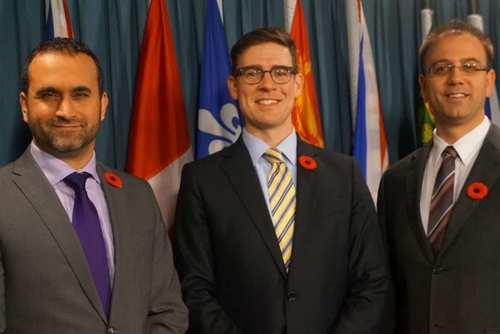
Cardus selects cabinet to mark Canada’s 150th
OTTAWA – The role of faith will not be left behind as Canada marks its 150th birthday in 2017. Cardus, Canada’s Christian think tank, unveiled its 40-member Cabinet of Canadians on Nov. 1, whose role will be to affirm faith’s central role in building Canada as it celebrates its landmark anniversary of Confederation. The Cabinet, part of the Faith in Canada 150 project, includes Toronto Cardinal Thomas Collins, Evangelical Fellowship of Canada president Bruce Clemenger, Catholic Christian Outreach (CCO) president Jeff Lockert and National Council of Canadian Muslims executive director Ishaan Gardee. It will help lead the conversation regionally and nationally on the importance of religious faith in Canada’s history. “There is growing discrimination against people of faith in Canada,” said Andrew Bennett, Cardus senior fellow and Canada’s former Ambassador of Religious Freedom. “We must speak out confidently and uphold this fundamental freedom in the face of growing intolerance of religious belief in our society.” The Cabinet includes not only religious leaders, but also academics, social entrepreneurs and business leaders who will act as a “vanguard” for the message that faith matters in Canada, he said. Cabinet co-chairs are Shachi Kurl, a public policy analysist with the Angus Reid Institute, and Balpreet Singh Boparai, legal counsel for the World Sikh Organization of Canada. While about 20 members of the cabinet represent Christian leaders from Catholic, Orthodox and various Protestant backgrounds, the cabinet includes a wide breadth of other faiths.
November 3, 2016
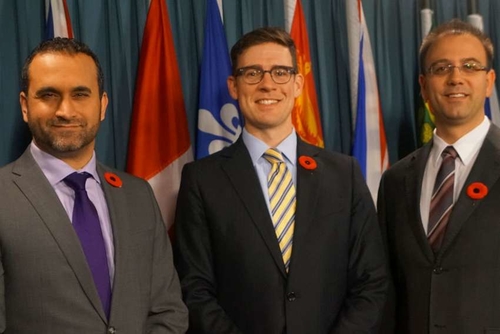
Une Nouvelle Initiative Multiconfessionnelle dans une Conjoncture de Moins en Moins Favorable à la Liberté Religieuse au Canada
Le 1er novembre 2016 OTTAWA—Le Dr Andrew Bennett, associé du groupe Cardus et président du Cabinet des Canadiens, a rendu public les noms de quelque 40 personnes qui s'emploieront à affirmer le rôle central que la foi a joué dans l'histoire du Canada et qu'elle continue de jouer aujourd'hui. " La pratique de la foi religieuse au Canada incite les Canadiens à poser de grands gestes ", a déclaré Bennett. " La foi est tout aussi bien publique que privée. Elle nous définit. Elle nous appelle à agir. Elle est vraie. Et elle est profondément canadienne. " Shachi Kurl, un analyste de politiques publiques, et Balpreet Singh Boparai, conseiller juridique de la World Sikh Organization of Canada, seront les co-présidents du Cabinet, qui sera composé en outre de personnes bien connues comme Anita Bromberg, directrice exécutive de la Fondation canadienne des relations raciales, Colin Jackson, président du conseil d'administration du Rosebud Centre for the Arts de Calgary, Shimon Fogel, chef de la direction du Centre for Israel and Jewish Affairs, Imam Abdul Hai Patel, fondateur et ancien coordonnateur du Canadian Council of Imams, et son éminence le cardinal Thomas Collins, archevêque catholique de Toronto. On trouvera ici une liste complète des membres du Cabinet. Le Cabinet des Canadiens est une initiative s'inscrivant dans le cadre de Foi dans le Canada 150 - un projet spécial de Cardus anticipant le 150e anniversaire de la Confédération en 2017. Les membres du Cabinet participeront à des activités, prendront la parole en public et écriront sur les apports de la foi à la vie publique au Canada. Ce faisant, ils expliqueront comment leur foi a enrichi leur vie et encadré leur engagement au sein de la collectivité. Bennett estime qu'il importe de faire place à des expressions publiques de la foi et de reconnaître ainsi la longue tradition de liberté religieuse au Canada, et ce, dans un contexte culturel où celle-ci est de plus en plus contestée. Selon Bennett, " les cas de discrimination contre les gens de foi au Canada se multiplient ". " Nous devons nous exprimer avec confiance et défendre cette liberté fondamentale qui se heurte à une intolérance croissante à l'égard des croyances religieuses dans notre société. Il suffit de considérer le cas de l'Ontario où les médecins pourraient être obligés d'aller à l'encontre de leur conscience en collaborant à l'euthanasie, et ce, en violation de leurs croyances religieuses les plus profondes. Des problèmes semblables se posent dans le cas des hôpitaux catholiques qui sont invités à faire fi de leurs objections à l'euthanasie, ou dans celui de l'Université Trinity Western dont les diplômes décernés par la faculté de droit ne sont pas reconnus par certaines Sociétés du Barreau en raison du pacte communautaire de cette institution privée de confession évangélique. " Le Cabinet des Canadiens souhaite commémorer le rôle historique de la foi dans notre pays, dans nos institutions et dans notre vie commune tout en réaffirmant cette foi aujourd'hui. -30- À propos de Cardus Cardus est un centre d'études axé sur le renouvellement de l'architecture sociale nord-américaine. Il poursuit des recherches indépendantes et originales, diffuse plusieurs revues et organise périodiquement des activités avec des associés et des organismes intéressés partout au Canada et aux États-Unis. Pour en savoir davantage, prière de consulter le site www.cardus.ca et de suivre nos activités sur Twitter @cardusca. RENSEIGNEMENTS SUPPLÉMENTAIRES POUR LES MÉDIAS Daniel Proussalidis Cardus - Directeur des communications 613.241.4500 x.508 dproussalidis@cardus.ca
November 1, 2016
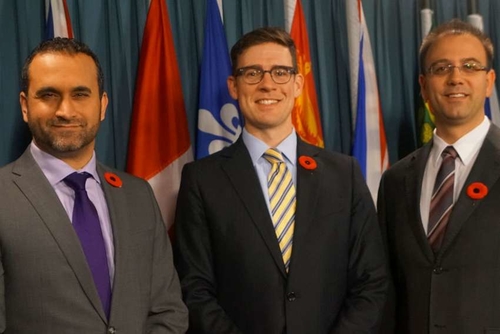
New Multi-Faith Initiative Launched Amid Worsening Climate for Religious Freedom in Canada
NEW MULTI-FAITH INITIATIVE LAUNCHED AMID WORSENING CLIMATE FOR RELIGIOUS FREEDOM IN CANADA Dr. Andrew Bennett announces full membership of Cabinet of Canadians November 1, 2016 OTTAWA—Dr. Andrew Bennett, Cardus Senior Fellow and Chair of the Cabinet of Canadians, has formally announced the names of almost 40 distinguished individuals who will help affirm the central role faith has played in Canada's history and continues to play today. "The practice of religious faith in Canada motivates Canadians to great acts," Bennett said. "Faith is public and private. It defines us. It calls us to action. It is true. And it is deeply Canadian." Shachi Kurl, a public policy analyst, and Balpreet Singh Boparai, legal counsel for the World Sikh Organization of Canada, will serve as Cabinet co-chairs. The Cabinet will also include such notable names as Anita Bromberg, Executive Director of the Canadian Race Relations Foundation, Colin Jackson, Chair of Calgary's Rosebud Centre for the Arts, Shimon Fogel, CEO of the Centre for Israel and Jewish Affairs, Imam Abdul Hai Patel, founder and past coordinator of the Canadian Council of Imams, and His Eminence Thomas Cardinal Collins, Roman Catholic Archbishop of Toronto. A full list of Cabinet members is available here.</> The Cabinet of Canadians is part of Faith in Canada 150—a special effort by Cardus ahead of the 150th anniversary of Confederation in 2017. Members of the Cabinet will attend events, speak publicly, and write about the contributions of faith to public life in Canada. In doing so, they will describe how their faiths have contributed to their lives and shaped their commitments to their communities. Bennett says it is especially important to celebrate public expressions of faith and thereby to champion the long tradition of religious freedom in Canada at a time when it is being greatly challenged. "There is growing discrimination against people of faith in Canada," Bennett said. "We must speak out confidently and uphold this fundamental freedom in the face of growing intolerance of religious belief in our society. Just look at Ontario where doctors could be forced to violate their consciences by referring patients for euthanasia against their deeply held religious beliefs. This is mirrored in the case of Catholic hospitals that are being pushed to set aside their prohibition on euthanasia, or law societies denying accreditation to Trinity Western University's proposed law school over dislike of the private evangelical school's community covenant." The Cabinet of Canadians aims to commemorate the historic role of faith in our country, our institutions, and our common life and to reaffirm it today. -30- About Cardus Cardus is a think tank dedicated to the renewal of North American social architecture. It conducts independent and original research, produces several periodicals, and regularly stages events with Senior Fellows and interested constituents across Canada and the U.S. To learn more, visit: www.cardus.ca and follow us on Twitter @cardusca. MEDIA INQUIRIES Daniel Proussalidis Cardus - Director of Communications 613.241.4500 x.508 dproussalidis@cardus.ca 905-528-8866
November 1, 2016
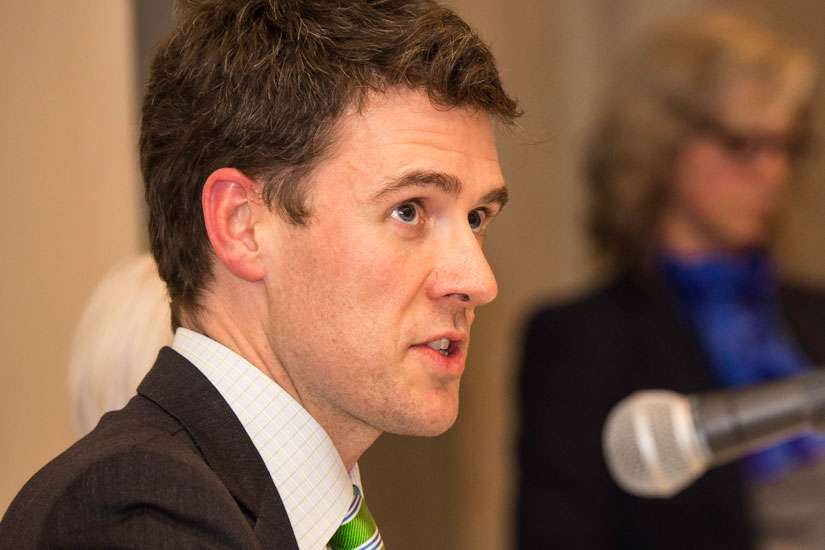
Former religious freedom ambassador embarks on new Cardus role
OTTAWA – Canadians must be willing to reject a growing perception that religion is a strictly private matter and instead be unafraid to publicly affirm their faith, said Canada’s former Religious Freedom Ambassador Andrew Bennett. Speaking May 19 at the launch of Faith in Canada 150, he also urged the rejection of the “post-Enlightenment myth” that religious belief and practices are private matters “best kept out of the public realm.” “This is historically inaccurate,” he said. “It is theologically wrong. And, above all, it robs from our fellow citizens the ability to actively participate in what can be tens of thousands of conversations, encounters, friendships and transformative actions that will strengthen our country.” Bennett’s three-year term as Religious Fresedom Ambassador ended in late March but he is staying on with Global Affairs Canada until June to help with the transition to the new Office of Human Rights, Freedoms and Inclusion, headed by Richard Arbeiter as Director General. Bennett has taken on a volunteer role with the Cardus as a senior fellow and Chair of the Cabinet of Canadians for the think tank’s Faith in Canada 150 program. He’ll oversee an ambitious national project that aims to tell the faith stories of Canada, host events and celebrations across the country, and build a network of faith leaders across Canada. “As we launch Faith in Canada 150 let us reaffirm the centrality of religious faith in Canadian history and in the lives of so many Canadians today,” Bennett said. Bennett affirmed the right of religious believers to speak up “honestly and out of deep respect for our often profoundly different beliefs.” He pointed to the professions of variety of faiths, Christian and non-Christian that have contributed to Canadian society through education, healthcare and helping the poor.
May 25, 2016
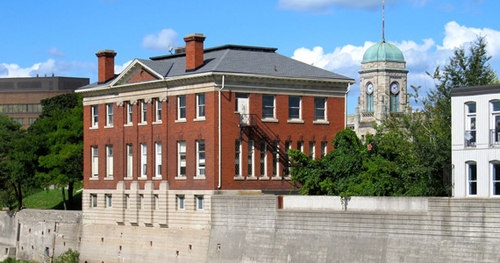
Faith Based Organizations Are Crucial to Cambridge’s Well-Being And Social Fabric
April 28, 2016
Media Contact
Daniel Proussalidis
Director of Communications
